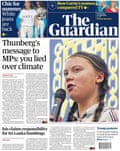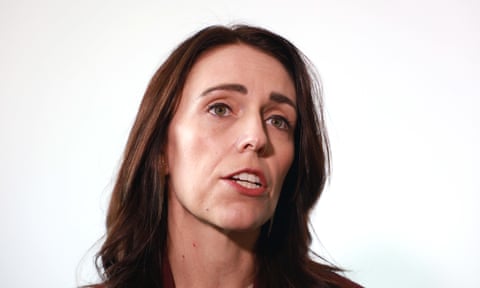Top story: France and NZ spearhead ‘Christchurch call’
Good morning – it’s Warren Murray with a first taste of the day’s news.
New Zealand’s prime minister, Jacinda Ardern, has declared there is no “right to livestream the murder of 50 people” as she spearheads a push to stop it happening again. Ardern and the French president, Emmanuel Macron, will host a mid-May summit in Paris calling on governments and tech companies to sign the “Christchurch Call” – a vow to eliminate terrorist and violent extremist content online.
The Christchurch gunman livestreamed the mosque shootings on Facebook and they were viewed hundreds of times before being taken down. “We want to maintain the principles of a free, open and secure internet, but this isn’t about freedom of expression, this is about preventing violent extremism and terrorism online,” Ardern said. “It’s critical that technology platforms like Facebook are not perverted as a tool for terrorism, and instead become part of a global solution to countering extremism.”
France holds the G7 presidency and will host an upcoming meeting for digital ministers.
Midweek catch-up
> In Hong Kong, a group of pro-democracy activists have just been given prison terms of up to 16 months for their role in the Umbrella Movement protests. They were convicted on rarely used colonial-era public nuisance charges over the 2014 demonstrations.
> The Sri Lankan president has called for a security overhaul and promised “stern action” against officials who failed to warn of the Easter Sunday attacks. The death toll has risen to 359. There are warnings several bombers could still be at large.
> The Trump administration is being condemned for weakening a UN resolution against the use of rape as a weapon of war. The US vetoed wording about victims’ right to sexual and reproductive healthcare, arguing it implied support for access to abortions.
> Theresa May has banned Chinese telecoms supplier Huawei from supplying core parts of the 5G mobile phone network over national security concerns but will let it supply some “non-core” technology to UK phone companies.
> In the Brexit talks, Jeremy Corbyn says Theresa May must stop “regurgitating what has already been emphatically rejected three times by parliament”. Tory MPs have discussed changing party rules to allow another no-confidence motion against May.
> Virgin has called for airline-style ticketing and other radical changes to train travel, including seats for all passengers on long-distance services. Interesting ideas but Virgin is actually banned from bidding on three upcoming rail franchises.
‘Bigger than Windrush’ – About 34,000 foreign students have had their visas cancelled or curtailed and more than 1,000 people were forcibly removed from the UK as a result of the English language testing scandal, in which the government sweepingly accused students of cheating on Home Office-approved tests. Others who stayed to clear their names have been told they cannot appeal and must leave the UK. The government cancelled visas after analysis suggested that out of 58,458 tests taken in 96 testing centres, at least 33,725 people cheated. Many of those saying they were wrongly accused have asked to sit a new English test, arguing they are fluent – some are studying for degrees in English literature, accountancy, law degrees and doctorates. Sajid Javid, the home secretary, is expected to rule on the fate of thousands of the targeted students this week.
Trump made to feel unwelcome – Backbenchers are gathering petition signatures to try and have Donald Trump’s state visit cancelled. At the least, angry MPs want to prevent him making an address to parliament marking the D-Day landings. The trip in June was confirmed by Buckingham Palace and the White House on Tuesday. Stephen Doughty, a Labour MP who is gathering signatures, said the invitation was “bonkers” and called Trump a “racist, sexist, extremist” whose presence would deepen divisions in the country. Anti-Trump campaigners have called for a protest in London on 4 June. “It will make lots and lots of people very angry,” said Asad Rehman, from the Stop Trump Coalition.
‘Poorest hit hardest’ by UC – The switch to universal credit will take more than £1,000 a year out of the hands of almost two million people, while 1.6 million will gain by more than £1,000 a year, the respected Institute for Fiscal Studies thinktank has concluded. The IFS said 11 million adults would lose or gain under the new rules. The research concludes that for many low-income families, losses will fall from more than £1,000 to nearer £100 across eight years. “However, even when measuring people’s incomes over relatively long periods, universal credit still hits the persistently poor the hardest on average,” said Tom Waters, an IFS research economist.
Every lick is part sniff – The tongue might pick up on odours as well as flavour, say researchers who have found smell-detecting proteins in the tastebuds. “I am not saying that [if you] open your mouth, you smell,” said Dr Mehmet Hakan Ozdener. Depends on your oral hygiene, the Briefing supposes … But seriously folks, what he means is that the tongue probably does not directly perceive smell – rather, our perception of taste might be tweaked by the presence of certain odour molecules. It opens up the possibility of tricking ourselves into healthier eating: for example, by adding a specific, subtle scent to a food to make it seem sweeter than it is, reducing the need for sugar, so we don’t get type 2 diabetes.
Today in Focus podcast: Sri Lanka’s terror
On Easter Sunday, eight explosions in churches and hotels across Sri Lanka killed hundreds of people and wounded many more. As the country reels in shock, Michael Safi describes reporting in the aftermath of the attack. And the Guardian’s chief political correspondent, Jessica Elgot, on what to expect from Brexit now parliament is back.
Lunchtime read: The problem with kidfluencers
They open boxes, play with toys, pull pranks, make slime and then chime the closing line: “Subscribe to my channel!” Children are among the biggest stars of YouTube and Instagram, earning millions through influencer deals.

But while today’s young stars can achieve fame and fortune, they have little or no protection from child labour exploitation. Who gets the money, and who polices their treatment? One US mother has been charged with subjecting her adopted children to horrific abuse if they failed to perform for her money-making YouTube channel. Now former child actors and legal experts are speaking out in hopes that parents and platforms either change their practices, or lawmakers and regulators get involved. Julia Carrie Wong reports.
Sport
A late goal to Christian Eriksen has powered Tottenham ahead of their top-four rivals, but condemned relegation-threatened Brighton to a morale-crushing 1-0 defeat. Meanwhile Pep Guardiola has scoffed at suggestions his City side will tactically foul opponents United, in a war of words ahead of their crucial Manchester derby.
Ronnie O’Sullivan has blamed a virus for his dramatic world snooker championship loss to 23-year-old amateur, James Cahill: “I feel absolutely shattered, drained, no energy, struggling to stay awake.” Meanwhile, veteran snooker champion Jimmy White opens up in a tell-all interview with Donald McRae, detailing his million-pound gambling habit, and battles with cocaine and cancer. And, cricket may not have specialist ball-throwing competitions any more, but as Andy Bull writes, Robert Percival’s record mark from 1882 looks set to stand the test of time.
Business
Equity markets in Asia have faltered amid losses in South Korea and worries that China has put any further stimulus on hold as the economy shows signs of regaining its footing. MSCI’s broadest index of Asia-Pacific shares outside Japan was 0.5% lower, erasing early gains in the wake of record closing highs on Wall Street overnight. Chinese equities dropped after early gains, pushing the blue-chip CSI300 index down 0.9% and extending losses for the week. Australian shares jumped as much as 1.1% to a more-than-11-year high after a sharp slowdown in Australian inflation raised the likelihood of an interest rate cut. A pound is worth $1.293 and €1.153 while the FTSE is headed for a lower open this morning.
The papers
Greta Thunberg’s speech to MPs features on the front pages of the Guardian: “Thunberg’s message to MPs: you lied over climate” and the Times: “Teenager inspires Britain to act on climate change”. The Mirror leads on the news of Trump’s impending state visit: “No room at the palace for Trump”, as does the i: “Let Trump address Parliament, Speaker told”.

The Sun reports that oil companies are failing to pass on savings from price falls: “Oil rigged”, while the Telegraph has: “May defies ministers and US over Huawei” as the prime minister approves 5G network role.
The FT says “European industrial chief pledges to bring jobs back from China” and the Mail has a story about the old bill not investigating all cases: “Police who give up on half of crimes”.
Sign up
The Guardian Morning Briefing is delivered to thousands of inboxes bright and early every weekday. If you are not already receiving it by email, you can sign up here.
For more news: www.theguardian.com
